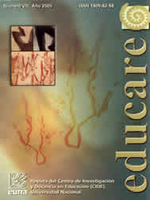Educación y gestión en América Latina
DOI:
https://doi.org/10.15359/ree.2005-8.2Abstract
Descriptive exercise that addresses the topic of Education Management in Latin America. It gives a general view of the socio-historical context in which this management has taken place.
The article first presents the development model spread by CEPAL (Spanish acronym for the Economic Commission of the UN for Latin America and the Caribbean) in Latin America after the second half of the twentieth century and its influence in shaping the educational model adopted by different countries of the region.
Then, we review the road traveled by the educational management process during the following decades. Finally, there is a brief description of the most important transformations this management has had after the challenges encountered during the beginning of the twenty-first century.
References
CEPAL (1990). La transformación productiva con equidad. La tarea prioritaria de América Latina y el Caribe. Santiago: CEPAL.
CEPAL/UNESCO (1992). Educación y Conocimiento: Eje de la transformación productiva con equidad. Santiago: CEPAL/UNESCO.
Ezpeleta Justa y Alfredo Furlan {Comp.). La gestión pedagógica de la escuela. Santiago: UNESCO/OREALC.
Medina, Echavarría, José (1979). Filosofía, Educación y Desarrollo. México: Siglo XXI.
Solano, J. (2001). Educación y Desarrollo en América Latina: Un análisis históricoconceptual, Heredia: EUNA.
Tedesco, J. (1992). "La gestión en la encrucijada de nuestro tiempo". En: Ezpeleta Justa y Alfredo Furlan (Comp.). La gestión pedagógica de la escuela. Santiago de Chile: UNESCO/OREALC.
Wolfe, M. ( 1981 ). "Estilos de desarrollo y educación: Un inventario de mitos, recomendaciones y potencialidades". Revi1tas de la CEPAL, Nº 21. Santiago: CEPAL
Published
How to Cite
Issue
Section
License
1. In case the submitted paper is accepted for publication, the author(s) FREELY, COSTLESS, EXCLUSIVELY AND FOR AN INDEFINITE TERM transfer copyrights and patrimonial rights to Universidad Nacional (UNA, Costa Rica). For more details check the Originality Statement and Copyright Transfer Agreement
2. REUTILIZATION RIGHTS: UNA authorizes authors to use, for any purpose (among them selfarchiving or autoarchiving) and to publish in the Internet in any electronic site, the paper´'s final version, both approved and published (post print), as long as it is done with a non commercial purpose, does not generate derivates without previous consentment and recognizes both publisher's name and authorship.
3. The submission and possible publication of the paper in the Educare Electronic Journal is ruled by the Journal’s editorial policies, the institutional rules of Universidad Nacional and the laws of the Republic of Costa Rica. Additionally, any possible difference of opinion or future dispute shall be settled in accordance with the mechanisms of Alternative Dispute Resolution and the Costa Rican Jurisdiction.
4. In all cases, it is understood that the opinions issued are those of the authors and do not necessarily reflect the position and opinion of Educare, CIDE or Universidad Nacional, Costa Rica. It is also understood that, in the exercise of academic freedom, the authors have carried out a rogorous scientific-academic process of research, reflection and argumentation thar lays within the thematic scope of interest of the Journal.
5. The papers published by Educare Electronic Journal use a Creative Commons License:














 The articles published by Educare Electronic Journal can be shared with a Creative Commons License:
The articles published by Educare Electronic Journal can be shared with a Creative Commons License: 



